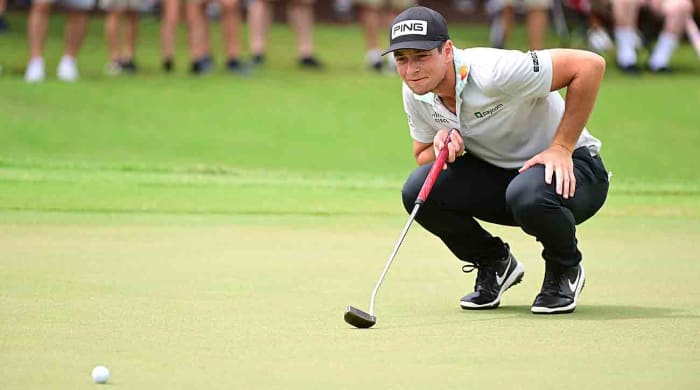More Weekly Read: LIV Golf Hopes CW Deal Bears Fruit | LIV Golf’s Schedule History | Go! Things
The Desert Swing on the former European Tour for years lured away some of the best players from PGA Tour events, to the point that the tournaments contested in the United Arab Emirates and to a lesser degree Qatar would almost certainly be rated higher in the world rankings than the competing events in America.
That has changed and it’s difficult not to point to the PGA Tour’s new series of “designated” events at least being part of the issue this year.
Perhaps the biggest warning sign: Viktor Hovland is not back to defend his title at the Dubai Desert Classic.

Viktor Hovland won’t defend a title this week in Dubai, probably because he’ll be very busy very soon on the PGA Tour.
Adam Hagy/USA TODAY Sports
Last week in Abu Dhabi, where France’s Victor Perez was the winner, Shane Lowry was the highest-ranked player in the field at No. 20. Golf Digest wondered why a Rolex Series event with a $9 million purse could so easily be ignored.
The easy answer is that guys who might normally play in the Middle East right now are busy racking up starts on the PGA Tour as part of the new program that requires those partaking in Player Impact Program (PIP) riches to play a minimum of 19 events (out of 20) in so-called designated events.
Part of that requires them to play three “other” tournaments that are not among the 17 designated, and the American Express Championship and this week’s Farmers Insurance Open have seen an uptick in those players.
For Hovland—who is not playing at Torrey Pines—it could also be a workload-management issue. Starting with the WM Phoenix Open in two weeks, there will be seven designated events in 10 weeks through the RBC Heritage the week following the Masters.
“I know there are guys who are in the US this week and next because they want to get off to good starts over there,” former European Ryder Cup player Nicolas Colsaerts said in the Golf Digest interview. “Which is a shame. It would have been nice to see a couple more Europeans coming over to play here. Just because how big these events are on our calendar. But how often guys have to play in the US is an issue. These events are victims of that.”
Rory McIlroy will headline the field in Dubai, and the No. 1-ranked player in the world will help give it a big boost—but he still won’t be able to push the winner’s ranking share beyond 30 points, an unheard-of low for Dubai.
The new world ranking system that went into effect in August that now uses a strokes-gained world rating system to count every player in the field has undoubtedly not helped the DP World Tour. PGA Tour fields are deeper, even when they don’t have strength at the top, and it has served to lessen the power of the DP World Tour events.
As Bernd Weisberger, who now plays for LIV Golf, said: “Even though the Rolex Series is really important to our (DP World Tour) membership, and there are a lot of great players here, you would still want to see a stronger field world ranking-wise.”
Weisberger, who is able to play the DP World Tour due to a court injunction that will be resolved late next month, admitted he was in the field to try and earn ranking points.
But it’s not enough to lure others around the world.
Call it some of the unintended consequences of the new PGA Tour system, made all the more interesting because of the strategic alliance between the tour tours.
Only the British Open this year is among the designated events, although it is likely that several players will use the Scottish Open the week prior as one of their three events, giving that tournament a lift.
But could there be a day when these big Middle East events gain some sort of co-sanctioning with the PGA Tour to allow for more PGA Tour members to play them?
It is one of many aspects that likely needs to unfold over this year as some big changes are still playing out.
.